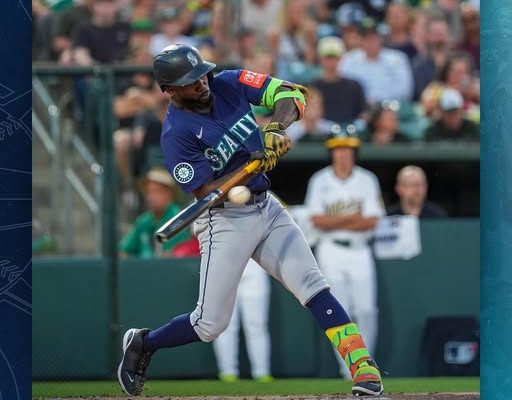The Seattle Mariners suffered a disheartening 6-1 loss to the Oakland Athletics, and frankly, the scoreboard doesn’t even capture the full measure of frustration. It wasn’t just a loss—it was a loud, flashing, undeniable reminder of the Mariners’ most glaring problem: an offense that seems to be stuck in a season-long slump with no sense of urgency to change course. While the Athletics came into this game dead last in the AL West and nowhere near playoff contention, they looked like the hungrier and more cohesive team on Tuesday night. And if that doesn’t trigger alarms within the Seattle front office, what will?
On the mound for the Mariners was Logan Evans, a pitcher still trying to find his footing in the big leagues. To his credit, Evans delivered a career-best performance in one category—strikeouts. He fanned seven Oakland hitters over the course of five innings, showing flashes of dominance and composure under pressure. But despite the promising strikeout tally, Evans also gave up six earned runs, with a few of those coming in clusters as the game slipped away in the middle innings. That’s the story of many young pitchers: high upside, big learning curves, and mistakes that good lineups know how to punish. Unfortunately, Evans didn’t have the luxury of a supportive offense to make up for those mistakes. Instead, he was left stranded, battling through innings without much run support, watching as the bats behind him fell flat again and again.
And that brings us to the most frustrating piece of this puzzle. The Mariners’ offense looked completely lost—disconnected, disengaged, and frankly uncompetitive. It wasn’t just a matter of bad luck or hard-hit balls landing in gloves. It was weak contact, poor pitch selection, and a visible lack of adjustments against a mediocre A’s pitching staff. Through the first five innings, Seattle managed just two hits. Not one hitter looked comfortable in the box. Whether it was Julio Rodríguez chasing pitches out of the zone or Cal Raleigh grounding out on the first pitch, it felt like this team was trying to swing its way out of a slump without any real plan or patience. The Mariners struck out nine times, many of them looking, and drew just one walk. Their lone run came in the eighth inning when the game was already well out of reach. At that point, the dugout had gone quiet and fans who made the trip to Oakland looked as demoralized as the players.
This isn’t a one-game issue. This is a recurring theme. The Mariners’ offense ranks near the bottom of the league in runs scored, on-base percentage, and strikeout-to-walk ratio. It’s become painfully evident that this team simply cannot rely on its pitching staff to win 2-1 games every night, especially when the rotation isn’t perfect. And that’s why the trade deadline looms so large. If the front office has any intention of making a playoff push—and that’s still within reach given the strength of their rotation and bullpen—then bold moves must be made. Not next week. Now.
There is no denying that Jerry Dipoto has built a strong foundation for this franchise. The pitching depth is legitimate. The bullpen can be lights-out. Young players like George Kirby, Bryce Miller, and Logan Gilbert give the Mariners the kind of stability most franchises dream of. But if there’s one lesson from this season, it’s that great pitching can only take you so far when the bats are this cold. This team desperately needs a middle-of-the-order bat. Not a platoon guy. Not a fringe upgrade. They need someone who can anchor the lineup, lengthen the order, and bring consistency to an offense that has been far too streaky. Whether that means prying away a controllable slugger from a team like the Nationals or paying a steep price for a short-term rental from a seller like the White Sox, it doesn’t matter. The message has to be clear: the Mariners aren’t content to waste another year of elite pitching because of an underwhelming offense.
The problem right now is not only a lack of execution but also a lack of identity at the plate. This team doesn’t seem to know what kind of offense it wants to be. Are they a power-hitting club? A speed-and-contact group? A patient, grind-it-out lineup? On most nights, they’re none of those things. There’s no cohesion from top to bottom. The top of the order, built around Rodríguez and J.P. Crawford, has been inconsistent. The middle, where hitters like Raleigh and Mitch Garver are supposed to produce, has been quiet. And the bottom of the order is a black hole, offering no support and no spark. It’s not enough to say players need to “step up.” The time for internal development passed two months ago. What this offense needs is a jolt of external energy. A veteran presence. A bat that forces opposing pitchers to alter their approach.
There are options out there. Cody Bellinger could be available. So could Luis Robert Jr. if the White Sox finally pull the plug. Even someone like Brent Rooker or Lane Thomas could represent a substantial upgrade over what the Mariners are trotting out every night. But it’s not just about making a move—it’s about making the right move. And that’s where Dipoto and general manager Justin Hollander need to be aggressive and unafraid. The division is winnable. The Astros aren’t running away with it. The Rangers are injured and inconsistent. And the A’s, as shown tonight, have nothing to lose. That means there’s a window—albeit a closing one—for Seattle to take control of their fate. But they can’t do it with an offense that keeps putting up one run on four hits.
The fan base is growing restless. And rightfully so. Mariners fans have waited years—decades—for this team to become a true contender. The playoff run in 2022 offered hope that things were finally turning around. But regression in 2023 and offensive dysfunction in 2024 have dulled that optimism. Every time the team has a chance to build momentum, games like this one pull them back down to earth. That emotional rollercoaster, more than anything, is exhausting. It’s also preventable. This doesn’t have to be a lost season. The pitching is too good. The talent too real. The opportunity too rare.
Logan Evans deserved better tonight. Yes, he gave up six runs. But a young pitcher can only go so far without run support. He showed resilience. He showed growth. And he even flashed a bit of swagger after striking out the side in the second inning. But as the game wore on and the scoreboard failed to change, it was clear the burden had become too much. No pitcher, rookie or ace, can consistently win when his offense gives him one run and no margin for error.
It’s now up to the front office to answer the bell. Standing pat is not an option. Waiting for internal options to “figure it out” is no longer viable. The sample size is large. The offense is broken. And the Mariners still have time to fix it—if they act decisively. If they don’t, nights like this one will continue to define the season. Games where promising arms are wasted. Games where fans check out by the fifth inning. Games where one team looks hungry and the other looks lost.
The calendar may still say July, but make no mistake: the clock is ticking. The Mariners can’t afford to waste another week hoping for improvement from within. This roster has strengths. The bullpen, led by Andrés Muñoz and Matt Brash, remains elite. The rotation, even with injuries, is still one of the best in baseball. But none of that matters if the bats keep coming up empty. The players know it. The coaches know it. And after tonight’s lifeless performance against one of the league’s worst teams, the fans know it too.
It’s time to swing big. Not just on the field, but in the front office. The Mariners have waited too long and built too much to let another season slip through the cracks because of a punchless offense. Either this team starts hitting, or this front office starts trading. Preferably both. If not, the only thing Seattle will be battling in September is regret.



